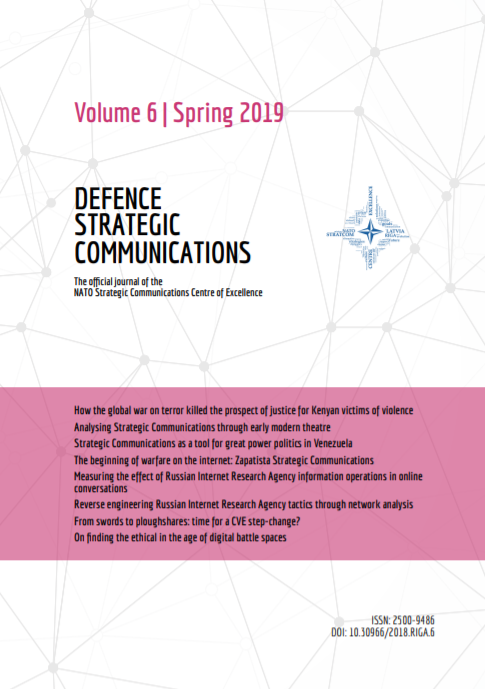HOW THE GLOBAL WAR ON TERROR KILLED THE PROSPECT OF JUSTICE FOR KENYAN VICTIMS OF VIOLENCE
HOW THE GLOBAL WAR ON TERROR KILLED THE PROSPECT OF JUSTICE FOR KENYAN VICTIMS OF VIOLENCE
Author(s): Karen AllenSubject(s): International Law, Security and defense, Studies in violence and power, Peace and Conflict Studies
Published by: NATO Strategic Communications Centre of Excellence
Keywords: International Criminal Court; strategic communications; Kenya; global war on terror; GWOT; al-Shabaab;
Summary/Abstract: This article assesses the dynamics of resistance and cooperation by Kenyan elites to the International Criminal Court (ICC) and the ongoing pressure for reform to Kenya’s security services, which were heavily implicated by a commission of inquiry into the post-election violence (PEV) of 2007/08.1 This article highlights the specific context of the global war on terror (GWOT) and Kenya’s role as a strategic partner in fighting the Somali Islamist group al-Shabaab, al-Qaeda’s African affiliate, as well as being a victim of al-Shabaab attacks. The terrorism narrative served to reinforce Kenya’s existing strategies of opposition. This does not imply that conflating justice and security issues was a strategy intentionally adopted from the outset. However, this article suggests that over time the utility of doing so became apparent. Moreover, the response of Kenya’s leaders to events at the ICC and Kenya’s resistance to security sector reform are worthy of close scrutiny. They highlight what appears to be an international realignment of principles of justice, driven by pragmatism. They also demonstrate the fragility of international justice mechanisms and how it is virtually impossible to divorce them from political contexts.
Journal: Defence Strategic Communications
- Issue Year: 6/2019
- Issue No: 6
- Page Range: 13-49
- Page Count: 37
- Language: English

